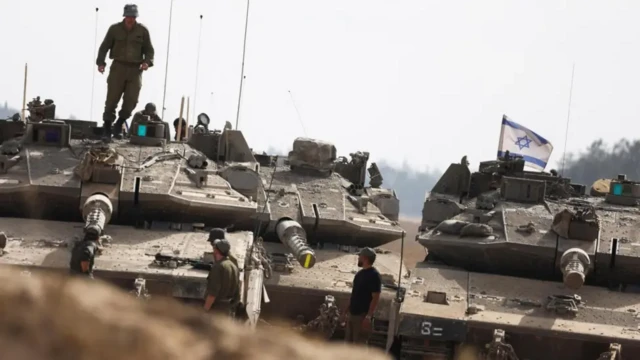Following the onset of the Israel-Hamas conflict on October 7, 2023, Israel has conducted an unyielding military operation in Gaza, predominantly utilizing weaponry and financial support provided by the United States. Following the unexpected assault by Hamas that resulted in the deaths of roughly 1,200 individuals, predominantly civilians, Israel experienced a surge of international support. Western governments, such as Canada, Britain, and France, articulated clear moral support, denouncing the Hamas assaults and confirming Israel’s right to self-defence. Recent developments indicate that this moral consensus may be beginning to disintegrate.
A significant change occurred with a joint declaration from Canada, the United Kingdom, and France that expressed an unusually severe stance towards Israel. The statement denounced Israel’s resumed military actions in Gaza and urged an immediate halt to hostilities. This signifies a pivotal shift in the diplomatic stance of three principal Western allies that had, until this moment, supported Israel’s activities on the pretext of countering terrorism and safeguarding national security.
The collective denunciation seems to be a direct reaction to the magnitude and severity of Israel’s continuous military operations in Gaza. Since the onset of the conflict, Gaza has endured significant destruction. Civilian infrastructure, including as hospitals, schools, and residential buildings, has been consistently targeted, eliciting condemnation from international humanitarian organizations.
Civilian casualties have escalated to tens of thousands, inciting outrage within global civil society and prompting a proliferation of pro-Palestinian demonstrations in Western countries. The outcry has intensified political pressure on Western nations to reevaluate their backing for Israel’s military operations.
French President Emmanuel Macron was among the initial leaders of the triumvirate to articulate profound worry. Macron cautioned that Israel’s actions were jeopardizing a wider regional conflict and compromising the fundamental ideals that Western democracies claim to support. The British government, led by Prime Minister Keir Starmer, has seen considerable internal criticism from both Parliament and the public, with numerous legislators advocating for a more equitable and humanitarian-oriented strategy. Likewise, Canadian Prime Minister Justin Trudeau has faced criticism from opposition parties and civil rights organizations, resulting in a discernible intensification of his position over Israel’s military actions.
The joint declaration indicates an increasing agreement that, although Israel possesses the right to self-defence, it must also comply with international law, especially for the safeguarding of people in armed combat. The presidents of the three states asserted that Israel’s declared aims, eradicating Hamas, liberating hostages, and reestablishing military dominance over Gaza, cannot rationalize the magnitude of devastation and the loss of innocent lives presently observed.
This diplomatic reprimand may signify a fracture in Western moral unity with Israel and indicate a reassessment of wider geopolitical affiliations. The United States, Israel’s most loyal friend, has thus far sustained its support; but there is growing bipartisan apprehension inside Washington regarding the long-term strategy and humanitarian consequences of Israel’s actions. If this transatlantic divergence persists, it may diplomatically isolate the U.S. or compel it to temper its position.
From a geopolitical perspective, the evolving rhetoric from major Western nations conveys a definitive message: unwavering support for Israel is not limitless. Military assistance and diplomatic support are becoming contingent upon compliance with humanitarian values and international law. The alteration is not only rhetorical. France and the United Kingdom, both permanent members of the UN Security Council, have initiated efforts to advocate for enforceable resolutions to establish ceasefires and humanitarian access corridors. Although Canada is not a member of the Security Council, it is expected to support similar initiatives in multilateral forums.
This changing stance may also influence Israel’s strategies on the battlefield and in wider negotiations. Prime Minister Netanyahu’s demand for total military triumph and the reoccupation of Gaza is increasingly regarded as politically and militarily impractical. As old friends start to distance themselves, Israel may experience a decline in diplomatic capital, particularly if the humanitarian consequences escalate without any strategic advantages.
The change in tone by France, Britain, and Canada at the grassroots level reflects widespread public sentiment. Social media, protest groups, and public discourse have increasingly scrutinized Israel’s war strategies. This public pressure has resulted in political repercussions, forcing elected leaders to take more critical positions or face the danger of alienating portions of their electorate.
The unified statement from Canada, Britain, and France indicates a crucial point in the international community’s involvement in the Israel-Gaza conflict, transcending mere diplomatic notation. It indicates increasing unease among Western nations on the ethical and strategic aspects of Israel’s military operations. Should this trajectory persist, it may not only modify the dynamics of the ongoing conflict but also redefine the parameters of Western support for Israel in the future.







